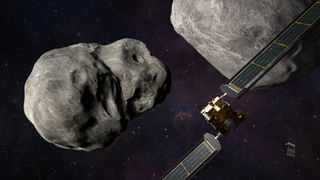What would happen if an asteroid were going to hit Earth? A NASA scientist explains.
What would happen if an asteroid were on its way to crash into our planet?
With NASA's DART asteroid deflection mission about to launch and a new movie asteroid disaster movie coming to Netflix, this question is hot on many people's minds. Now, a NASA scientist has weighed in on what the agency would do if there really was an asteroid about to collide with Earth.
Thankfully, NASA has found no imminent asteroid threats to Earth during its many decades of searching. But just in case, the agency always has a backup plan (or multiple), as NASA program scientist Kelly Fast says in a new video.
For those looking to have some fun thinking about "what if," Netflix's fictional astronaut movie, "Don't Look Up," will be released this December.
Related: Potentially dangerous asteroids (images)

Fast, the program manager for NASA's near-Earth object observations program, is a part of the agency's Planetary Defense Coordination Office. The office, with a mandate to study these threats from Congress, works with a range of partner telescopes to scan the skies and help to figure out logistical matters in impact scenarios.
"It's important to find asteroids before they find us, in case we need to get them before they get us," Fast says in the video. "An asteroid impact is the only natural disaster that could be prevented. NASA's Planetary Defense Coordination Office supports projects to discover asteroids and to calculate their orbits far into the future."
Get the Space.com Newsletter
Breaking space news, the latest updates on rocket launches, skywatching events and more!
Related: The greatest asteroid encounters of all time!
Fast also talked about the impending launch of the Double Asteroid Redirection Test (DART), which is scheduled to depart on Nov. 23. The spacecraft will eventually slam into a small asteroid orbiting a larger asteroid to see if the maneuver will change its course so it orbits closer. Measurements on the moon's orbit will be made to see if the path shifted, in partnership with a European Space Agency spacecraft.
The eventual goal for this mission is to test potential asteroid-diverting technologies in case a small space rock was on a threatening path to Earth.
NASA also has a range of other missions, past and present, to study asteroids and comets (not to mention the suite of international missions, some of which have picked up samples along the way.) These studies are not only about asteroid diversion but also about trying to figure out how these small bodies fit into the evolution of the solar system.
On Oct. 16, NASA launched the Lucy mission to study the Trojan asteroids in Jupiter's orbit. NASA's Psyche mission will launch in 2022 to study a metal asteroid up close. Then in 2023, we should see some grains of dust land on Earth from asteroid Bennu, via the asteroid sample-return mission OSIRIS-REx (Origins-Spectral Interpretation-Resource Identification-Security-Regolith Explorer).
One large win for asteroid science came earlier this year, when new measurements of the potentially threatening asteroid Apophis determined it won't hit us after all, anytime in the near future. All known asteroids and comets have their orbits published publicly on NASA Jet Propulsion Laboratory's website and the website of the International Astronomical Union's Minor Planet Center, among other entities.
Follow Elizabeth Howell on Twitter @howellspace. Follow us on Twitter @Spacedotcom and on Facebook.
Join our Space Forums to keep talking space on the latest missions, night sky and more! And if you have a news tip, correction or comment, let us know at: community@space.com.

Elizabeth Howell (she/her), Ph.D., is a staff writer in the spaceflight channel since 2022 covering diversity, education and gaming as well. She was contributing writer for Space.com for 10 years before joining full-time. Elizabeth's reporting includes multiple exclusives with the White House and Office of the Vice-President of the United States, an exclusive conversation with aspiring space tourist (and NSYNC bassist) Lance Bass, speaking several times with the International Space Station, witnessing five human spaceflight launches on two continents, flying parabolic, working inside a spacesuit, and participating in a simulated Mars mission. Her latest book, "Why Am I Taller?", is co-written with astronaut Dave Williams. Elizabeth holds a Ph.D. and M.Sc. in Space Studies from the University of North Dakota, a Bachelor of Journalism from Canada's Carleton University and a Bachelor of History from Canada's Athabasca University. Elizabeth is also a post-secondary instructor in communications and science at several institutions since 2015; her experience includes developing and teaching an astronomy course at Canada's Algonquin College (with Indigenous content as well) to more than 1,000 students since 2020. Elizabeth first got interested in space after watching the movie Apollo 13 in 1996, and still wants to be an astronaut someday. Mastodon: https://qoto.org/@howellspace